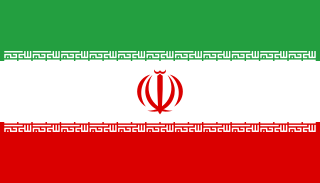
The Baháʼí Faith is a religion founded in the 19th century that teaches the essential worth of all religions and the unity of all people. Established by Baháʼu'lláh, it initially developed in Qajar Iran and parts of the Middle East, where it has faced ongoing persecution since its inception. The religion is estimated to have 5 to 8 million adherents, known as Baháʼís, spread throughout most of the world's countries and territories.

Persian, also known by its endonym Farsi or Parsi, is a Western Iranian language belonging to the Iranian branch of the Indo-Iranian subdivision of the Indo-European languages. Persian is a pluricentric language predominantly spoken and used officially within Iran, Afghanistan, and Tajikistan in three mutually intelligible standard varieties, namely Iranian Persian, Dari Persian, and Tajiki Persian. It is also spoken natively in the Tajik variety by a significant population within Uzbekistan, as well as within other regions with a Persianate history in the cultural sphere of Greater Iran. It is written officially within Iran and Afghanistan in the Persian alphabet, a derivative of the Arabic script, and within Tajikistan in the Tajik alphabet, a derivative of the Cyrillic script.

Iran, also known as Persia and officially the Islamic Republic of Iran (IRI), is a country in West Asia. It is bordered by Iraq to the west and Turkey to the northwest, Azerbaijan, Armenia, the Caspian Sea and Turkmenistan to the north, Afghanistan to the east, Pakistan to the southeast, the Gulf of Oman & the Persian Gulf to the south. With almost 90 million people in an area of 1.648 million square kilometres, Iran ranks 17th in the world in both geographic size and population. The country is divided into five regions with 31 provinces. The nation's capital and most populous city is Tehran, with around 16 million people in its metropolitan area, other major urban centres include Mashhad, Isfahan, Karaj, and Shiraz.

The Iran–Contra affair, often referred to as the Iran–Contra scandal, was a political scandal in the United States that occurred during the second term of the Reagan administration. Between 1981 and 1986, senior administration officials secretly facilitated the illegal sale of arms to Iran, which was subject to an arms embargo at the time. The administration hoped to use the proceeds of the arms sale to fund the Contras, an anti-Sandinista rebel group in Nicaragua. Under the Boland Amendment, further funding of the Contras by legislative appropriations was prohibited by Congress, but the Reagan administration figured out a loophole by secretively using non-appropriated funds instead.

The Iran–Iraq War, also known as the First Gulf War, was an armed conflict between Iran and Iraq that lasted from September 1980 to August 1988. Active hostilities began with the Iraqi invasion of Iran and lasted for eight years, until the acceptance of United Nations Security Council Resolution 598 by both sides. Iraq's primary rationale for the attack against Iran cited the need to prevent Ruhollah Khomeini—who had spearheaded the Iranian Revolution in 1979—from exporting the new Iranian ideology to Iraq. There were also fears among the Iraqi leadership of Saddam Hussein that Iran, a theocratic state with a population predominantly composed of Shia Muslims, would exploit sectarian tensions in Iraq by rallying Iraq's Shia majority against the Baʽathist government, which was officially secular and dominated by Sunni Muslims. Iraq also wished to replace Iran as the power player in the Persian Gulf, which was not seen as an achievable objective prior to the Islamic Revolution because of Pahlavi Iran's economic and military superiority as well as its close relationships with the United States and Israel.

Kurds or Kurdish people are an Iranic ethnic group native to the mountainous region of Kurdistan in Western Asia, which spans southeastern Turkey, northwestern Iran, northern Iraq, and northern Syria. There are exclaves of Kurds in Central Anatolia, Khorasan, and the Caucasus, as well as significant Kurdish diaspora communities in the cities of western Turkey and Western Europe. The Kurdish population is estimated to be between 30 and 45 million.
The Persians are an Iranian ethnic group who comprise over half of the population of Iran. They share a common cultural system and are native speakers of the Persian language as well as of the languages that are closely related to Persian.

Ayatollah Ruhollah Musavi Khomeini was an Iranian Islamic revolutionary, politician, and religious leader who served as the first supreme leader of Iran from 1979 until his death in 1989. He was the founder of the Islamic Republic of Iran and the leader of the Iranian Revolution, which overthrew Mohammad Reza Pahlavi and ended the Iranian monarchy.

Zoroastrianism, also known as Mazdayasna and Behdin, is an Iranian religion. One of the world's oldest organized faiths, it is based on the teachings of the Avesta and the Iranian prophet Zoroaster. It has a dualistic cosmology of good and evil within the framework of a monotheistic-style ontology; meaning that the religion's eschatology predicts the ultimate triumph of good over evil. Zoroastrians exalt an uncreated and benevolent deity of wisdom, commonly referred to as "Ahura Mazda", as the universe's supreme being; opposed to Ahura Mazda is "Angra Mainyu", who is personified as a destructive spirit and the adversary of all things good. Historically, the unique features of Zoroastrianism, such as monotheism, messianism, belief in free will and judgement after death, conception of heaven, hell, angels, and demons, among other concepts, may have influenced other religious and philosophical systems, including the Abrahamic religions and Gnosticism, Northern Buddhism, and Greek philosophy.

Tehran is the capital and largest city of Iran and also the largest city in Tehran Province. It also serves as the capital of the province, county and the Central District. With a population of around 9 million and 400 thousand in the city and around 16 million and 800 thousand in the larger metropolitan area of Greater Tehran, The Greater Tehran contains Towns example "New Town of Andisheh", "Islam Shahr", "Shahreh Qods", "Shahryar", "Pakdasht", "Firooz Kooh" and "Shamiran". Tehran is the most populous city in Iran and Western Asia, and has the second-largest metropolitan area in the Middle East, after Cairo. It is ranked 24th in the world by metropolitan area population. Archaeological remains from the ancient city of Ray suggest that settlement in Tehran dates back over 6,000 years.

The history of Iran is intertwined with that of Greater Iran, a sociocultural region spanning the area between Anatolia in the west and the Indus River and Syr Darya in the east, and between the Caucasus and Eurasian Steppe in the north and the Persian Gulf and the Gulf of Oman in the south. Central to this area is the modern-day country of Iran, which covers the bulk of the Iranian plateau.

The Iran hostage crisis was a diplomatic standoff between Iran and the United States. Fifty-three American diplomats and citizens were held hostage after a group of militarized Iranian college students belonging to the Muslim Student Followers of the Imam's Line, who supported the Iranian Revolution, including Hossein Dehghan, Mohammad Ali Jafari and Mohammad Bagheri, took over the U.S. Embassy in Tehran and took them as hostages. The hostages were held for 444 days, from November 4, 1979 to their release on January 20, 1981. The crisis is considered a pivotal episode in the history of Iran–United States relations.

The Iran national football team, recognised by FIFA as IR Iran, represents Iran in international senior football and is controlled by the Football Federation Islamic Republic of Iran (FFIRI).

The Iranian Revolution, also known as the Islamic Revolution, was a series of events that culminated in the overthrow of the Pahlavi dynasty in 1979. The revolution also led to the replacement of the Imperial State of Iran by the present-day Islamic Republic of Iran, as the monarchical government of Mohammad Reza Pahlavi was superseded by the theocratic government of Ayatollah Ruhollah Khomeini, a religious cleric who had headed one of the rebel factions. The ousting of Pahlavi, the last Shah of Iran, formally marked the end of Iran's historical monarchy.

Seyyed Ali Hosseini Khamenei is an Iranian Twelver Shia marja' and politician who has been the second supreme leader of Iran since 1989. He previously served as third president of Iran from 1981 to 1989. Khamenei is the longest-serving head of state in the Middle East, as well as the second-longest-serving Iranian leader of the last century, after Shah Mohammad Reza Pahlavi.

The Islamic Revolutionary Guard Corps, also called Sepah or Pasdaran, is a multi-service primary branch of the Iranian Armed Forces. It was officially established by Ruhollah Khomeini as a military branch in May 1979, in the aftermath of the Iranian Revolution. Whereas the Iranian Army protects the country's sovereignty in a traditional capacity, the IRGC's constitutional mandate is to ensure the integrity of the Islamic Republic. Most interpretations of this mandate assert that it entrusts the IRGC with preventing foreign interference in Iran, thwarting coups by the traditional military, and crushing "deviant movements" that harm the ideological legacy of the Islamic Revolution. Currently, the IRGC is designated as a terrorist organization by Bahrain, Saudi Arabia, Sweden and the United States.

Mahmoud Ahmadinejad is an Iranian principlist and nationalist politician who served as the sixth president of Iran from 2005 to 2013. He is currently a member of the Expediency Discernment Council. He was known for his hardline views and nuclearisation of Iran. He was also the main political leader of the Alliance of Builders of Islamic Iran, a coalition of conservative political groups in the country, and served as mayor of Tehran from 2003 to 2005, reversing many of his predecessor's reforms.

The Iranian peoples or Iranic peoples are a diverse grouping of peoples who are identified by their usage of the Iranian languages and other cultural similarities.

Mohammad Reza Pahlavi, commonly referred to in the Western world as Mohammad Reza Shah, or just simply The Shah, was the last monarch of Iran. He began ruling the Imperial State of Iran after succeeding his father Reza Shah in 1941 and remained in power until he was overthrown by the 1979 Iranian Revolution, which abolished the country's monarchy and established the Islamic Republic of Iran. In 1967, he took up the title Shahanshah and held several others, including Aryamehr and Bozorg Arteshtaran.

The Iran–Israel proxy conflict, also known as the Iran–Israel proxy war or Iran–Israel Cold War, is an ongoing proxy conflict between Iran and Israel. In the Israeli–Lebanese conflict, Iran has supported Lebanese Shia militias, most notably Hezbollah. In the Israeli-Palestinian conflict, Iran has backed Palestinian groups such as Hamas. Israel has supported Iranian rebels, such as the People's Mujahedin of Iran, conducted airstrikes against Iranian allies in Syria and assassinated Iranian nuclear scientists. In 2018 Israeli forces directly attacked Iranian forces in Syria.



















